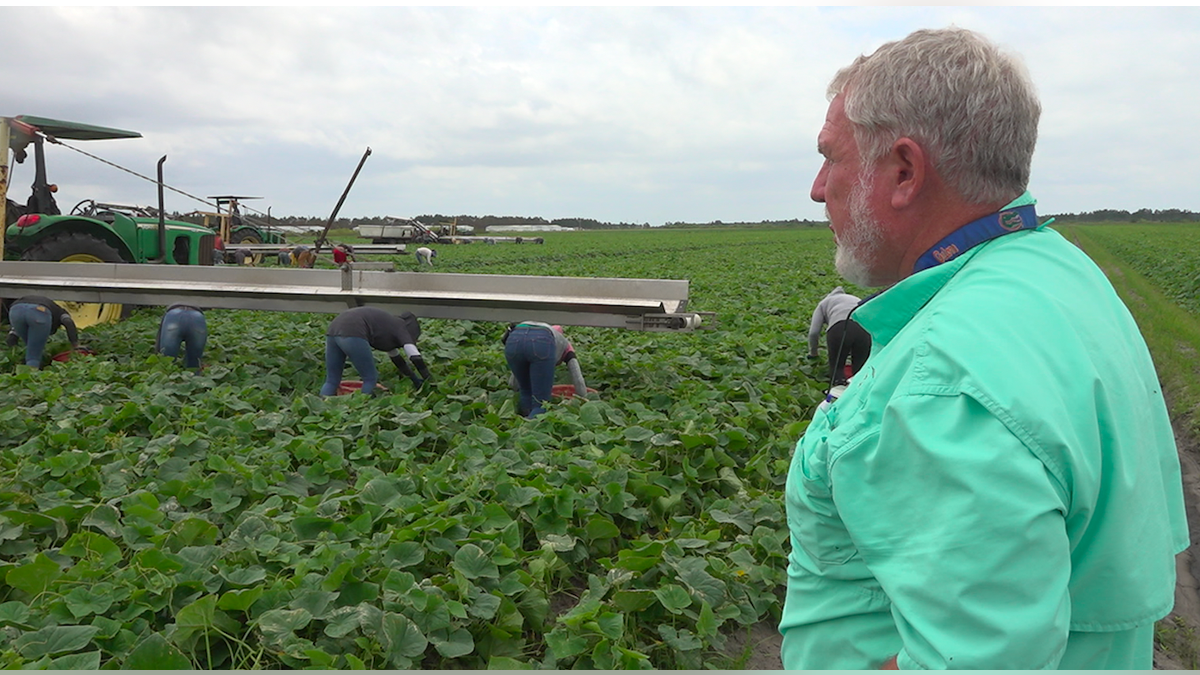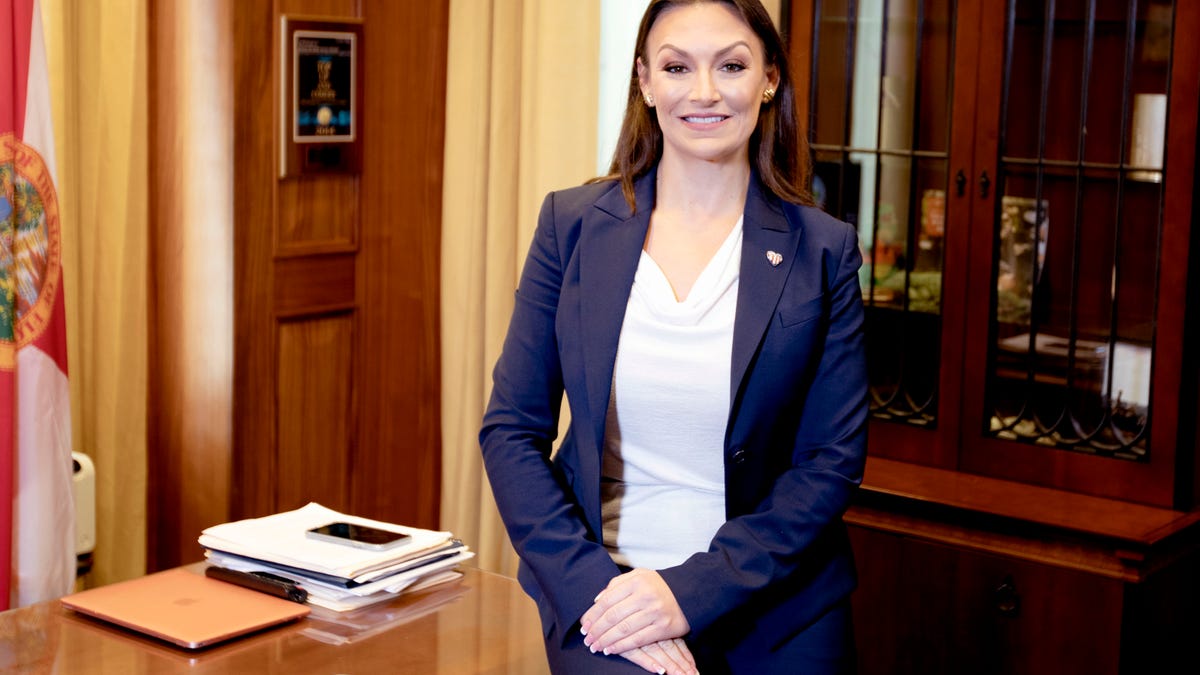Florida farmers face severe losses amid coronavirus outbreak
With the coronavirus outbreak limiting the number of produce buyers, Florida farmers are facing severe hardship this spring.
Get all the latest news on coronavirus and more delivered daily to your inbox. Sign up here.
MOUNT DORA, Fla. -- For Hank Scott, it was supposed to be a harvest to remember.
The weather was seemingly perfect. The cucumbers he has been harvesting for over 40 years at Long and Scott Farms in Mount Dora, Fla., were growing even faster than usual.
While walking through his more than 1,100-acre farm, he couldn’t help but admire the striking beauty of this year’s crop.
“This is probably the best pickle crop this farm has ever seen,” Scott told Fox News.

Hank Scott, Owner of Long and Scott Farms in Mount Dora, Fla., looks on as his crew harvests this spring's crop of cucumbers (Robert Sherman, Fox News).
Scott, who has been farming in Florida his whole life, explains that the spring is the best time for local farmers because the Sunshine State gets the opportunity to beat everyone else to the market with little competition. For this year’s spring harvest, he was looking at bringing in a haul of 10 million pounds of cucumbers.
The coronavirus pandemic changed everything.
“Well, at this point, we have a 50 percent loss of our major spring crop,” Scott said. “If they’re gonna keep things shut down for another two or three weeks to the first or middle of May, that’ll probably take the rest of it.”
CLICK HERE FOR FULL CORONAVIRUS COVERAGE
When asked for clarity, he reaffirmed that stance: a potential 100 percent loss on his cucumber crop this spring.
The issue isn’t related to farming the crops or harvesting. Once cucumbers are picked, they have to be sold, and Scott said therein lies the problem.
Nikki Fried, commissioner of the Florida Department of Agriculture, agrees.

Nikki Fried, Commissioner of the Florida Department of Agriculture (Photo courtesy of Nikki Fried's office).
“Our typical routes to the market are to [theme parks], to the cruise line industry, to restaurants and even to schools,” Fried told Fox News.
Right now, many of the state’s largest produce consumers are shut down, leaving fewer buyers for farmers to sell to.
FLORIDA'S ECONOMIC 'BACKBONE' OF TOURISM FACES HARDSHIP FROM CORONAVIRUS, EYES RECOVERY
Fried’s office recently released a study that shows the problem is widespread, and to this point, an estimated $522.5 million in Florida crops are now lost. With Florida being the nation’s second-largest producer of seasonal specialty crops, and 13.8 percent of all jobs in the state revolving around the agriculture industry in 2014, the pain is severe.
Shasta Hilyer, a blueberry farmer and owner of Twin Berry Farms in McAlpin, Fla, said her team began harvesting in March right before many businesses shut down.

Shasta Hilyer (center), owner of Twin Berry Farms in McAlpin, Fla., pictured alongside her family (Shasta Hilyer, Twin Berry Farms).
Now, she doesn’t know what to do.
“Right now, with only the grocery stores open, everyone is trying to sell their commodities to the grocery stores," Hilyer said. "So, when you take 100 percent of the market trying to get into the grocery store when it’s typically only 50 percent or 60 percent, it’s just flooded the market. We have not been able to sell any of our produce yet.”
Hilyer has tried to switch gears and sell locally as much as possible, but it's not the same. This time last year, she had sold about 250,000 pounds of blueberries. So far, her sales are only about 15,000 pounds in 2020.

Twin Berry Farms has switched over from commercial to local sales in order to keep business going (Shasta Hilyer, Twin Berry Farms).
In total, she’s looking at a 95 percent loss. But because her blueberries can only be harvested once a year, and the whole harvest comes down to a single six-week window in the spring, it will take years to make it up, she said.
“If you have five great seasons after this one -- and by great, I mean everything went perfect for you -- after five great seasons I would think you would start balancing yourself out," Hilyer said.
Fried’s office has started a campaign called “Keep Florida Growing,” which includes a commodities list meant to help connect consumers with growers. Her message to the community is to “demand” locally-grown produce and head to nearby farmer's markets -- now more than ever.
So far, the program seems to be helping.
“What we’re seeing in the state of Florida is this consumer awakening,” Fried said. “The consumer is finally starting to understand how important it is to support your domestic growers.”
DESANTIS SAYS FLORIDA IS PROOF THAT STATES CAN FLATTEN THE CURVE WITHOUT 'DRACONIAN' ORDERS
With food pantries seeing unprecedented shortages, a common thought has been for Florida farmers to donate their unsellable crops to help meet the demand. Fried said growers are donating millions of pounds, but it’s simply not sustainable for them.
“For the farmer who’s losing $250,000 a day, how long can they still have their workforce go out there and pick fruits and vegetables knowing they’re just donating it?” Fried said.

A worker unloads a delivery of produce at Second Harvest Food Bank of Central Florida (Erika Spence, Second Harvest Food Bank).
Fried, the state's only statewide elected Democrat, is in favor of reopening the state’s economy, but not prematurely. She wants to make sure that the appropriate coronavirus testing is in place and a plan is structured before Florida proceeds forward.
CLICK HERE TO GET THE FOX NEWS APP
Scott, on the other hand, believes that time is of the essence.
“It’s killing our economy,” Scott said. “We’ve just got to get back to work and sooner than later. I don’t think we can wait two weeks to get it going. It needs to happen now.”









































